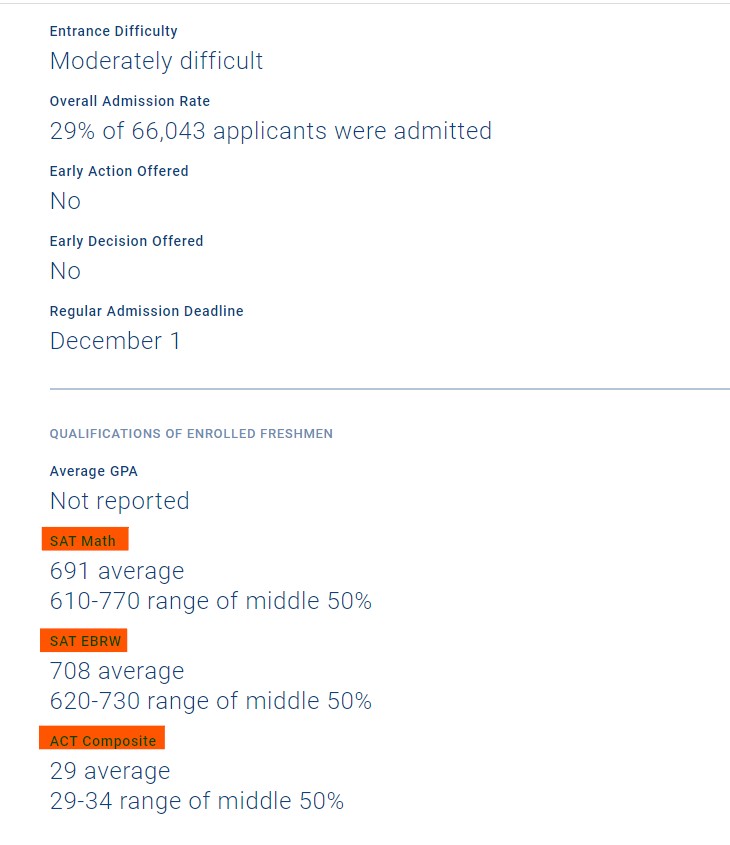Tips and Resources for SAT Prep, ACT Prep and PSAT Prep

Whether you plan to enroll in a test prep course or study by yourself, you’ll want to make the most of your SAT, ACT and PSAT study time. These 4 tips can help keep you motivated and on track to do your best on test day.
1. Determine Your Target Score
SAT and ACT test prep experts often say the first step in studying for the ACT or SAT is to find your “target” or “goal” score. To find your target score, look at the average test scores of recently enrolled freshmen at the colleges you plan to apply to. You can find these average scores in the College Profiles on CollegeData. The College Profile will report the “middle 50%” score range for the SAT’s English-Based Reading and Writing (EBRW) and Math tests, as well as the middle 50% composite ACT score, if the college reported it.
In the example below, University of Texas at Austin’s middle 50% ACT score range is between 26 and 33. This means 25% of enrolled freshmen at UT Austin scored below 26 on the ACT and 25% scored above 33. The remaining 50% of enrolled freshmen scored between 26 and 33. If you hope to be admitted to UT Austin, your target ACT score would fall at the higher end of this range and preferably above it.
UT Austin's Average Test Scores
Source: UT Austin's College Profile, 2021-2022. CollegeData.com
You’ll want to look at the middle 50% score ranges for each college on your list, select the highest range among your colleges, and shoot for a score near the top or above this range. In other words, if the highest ACT score range for all colleges on your list is 26 – 33, your target ACT score might be 33 or 34.
How to find ACT and SAT Score Averages on CollegeData
To find the average SAT and ACT scores of enrolled freshmen at the colleges you are interested in, look up the college’s College Profile on CollegeData, using College Search. On the College Profile, the middle 50% SAT and ACT scores are displayed under “Qualifications of Enrolled Freshmen” on the Overview tab.
Your target score might also be influenced by scholarships from private organizations or colleges, which sometimes have a minimum SAT or ACT score to qualify.
If you’re studying for the PSAT, keep in mind the average scores for National Merit Scholarship consideration. The qualifying scores change each year and differ by state. Check with your guidance counselor to find out the qualifying scores for your state.
2. Take Practice Tests to See Where You Stand—and How You’re Improving
Taking practice SAT, ACT, or PSAT tests will help you determine your “baseline” score, and how far you need to go to reach your target score. Practice tests may also help you identify the areas of the test in which you are the strongest and weakest. It’s important to take an official practice test offered by the ACT or College Board (which administers the SAT and PSAT), because they are more likely to simulate questions you’ll see on the actual tests.
However, taking a practice test and noting your score isn’t enough. Kaplan test prep (the official ACT test prep organization) recommends that you go through every incorrect answer carefully to understand where you went wrong, familiarize yourself with the questions on the test, and analyze your results. You might find that you need to work on a certain type of question as opposed to an entire subject area.
3. Create a Test Prep Schedule
Test prep companies and private tutors have different advice and strategies for the number of study hours required to achieve different target scores. Regardless of your goals, a study schedule is critical. Your schedule might consist of a few hours of study a couple of days a week, or an hour every morning on weekdays with longer periods of study on the weekends. It depends on your goals, the number of areas you need to practice, and the time you have available to study.
It’s a good idea to set up a calendar mapping out your study plan up until your scheduled test day. It’s also important to take practice tests regularly to measure your progress and adjust your study time as needed.
Visit Kaplan’s website for a 3-month ACT test prep schedule or Khan Academy for a customized SAT practice plan.
4. Mix it Up
Use a variety of test prep resources. You might purchase a test prep book, subscribe to an SAT or ACT question of the day, watch YouTube videos, or download an SAT or ACT test prep app on your phone.
A virtual or in-person tutor, paid classes or an online study group are other ACT and SAT test prep options you might consider to add variety to your study routine. The ACT Academy and Khan Academy websites provide a variety of free SAT and ACT test prep options including videos, games and more.
Studying for the ACT or SAT can feel overwhelming. These tips should help set you off on the right study path and give you the best chance of achieving your test score goals. Good luck!




